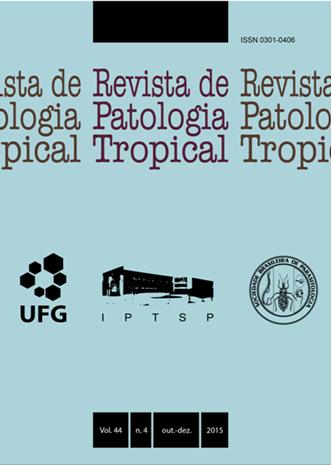COPROPARASITOLOGICAL SURVEY OF INTESTINAL PARASITES IN THE CITY OF LONDRINA, PARANA, BRAZIL: A RETROSPECTIVE ANALYSIS
DOI:
https://doi.org/10.5216/rpt.v44i4.39234Keywords:
Intestinal parasites, parasitological diagnosis, helminths, protozoa, public health.Abstract
Intestinal parasites are a major public health problem. It is important to inform and educate the public about these infections, especially where such data are scarce. This study aimed to determine the prevalence of intestinal parasites from the analysis of medical records of individuals of the city of Londrina. We analyzed 11,641 fecal reports from February 2009 to December 2012. Data were cataloged after the completion of parasitological testing of Hoffmann, Pons & Janer, Faust and Kato-Katz. From 11,641 reports, 19.1% were positive for intestinal parasites. Among those, 52.1% pertained to females and 47.9% to males, with predominance of positivity of 27.1% among children 0-10 years. For the regions studied, the northern region stood out with 35.4% of cases and prevalence of 6.8%. Among the pathogenic protozoa, reports of Giardia lamblia comprised 19.1% of positivity, while hookworms were the most frequent among helminths, comprising 7.8% of positive cases. It follows that poor conditions of basic sanitation contribute to the dissemination of these parasites. Early diagnosis is a determinant of successful treatment. Additionally, epidemiological data may be used to study the risk factors for transmission and may result in measures applicable to improving living conditions in the communityDownloads
Downloads
Published
How to Cite
Issue
Section
License
The manuscript submission must be accompanied by a letter signed by all authors stating the full name and email address, confirming that the material has not been published or is under consideration for publication elsewhere, and agreeing to transfer copyright in all media and formats for Journal of Tropical Pathology. The authors will not be paid for published articles. They are solely responsible for the content of those articles, even if the Editor holds the right to adjust them to the norms of the journal.
The reviewers will not be paid for the peer review process.

